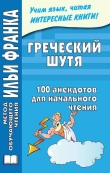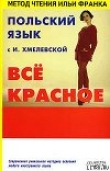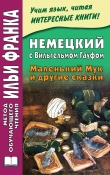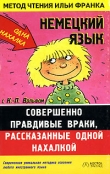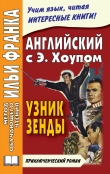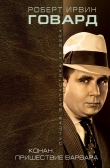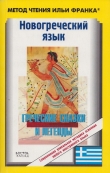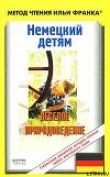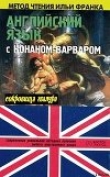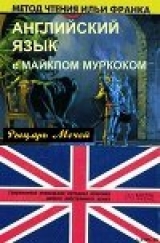
Текст книги "Английский язык с М. Муркоком"
Автор книги: Майкл Джон Муркок
Соавторы: Илья Франк,Андрей Еремин
Жанры:
Языкознание
,сообщить о нарушении
Текущая страница: 10 (всего у книги 36 страниц)
Corum looked at the ground (Корум посмотрел на землю = опустил голову). So it was complacency that had brought down the Vadhagh race (значит, это благодушие/самодовольство погубило вадагский народ; to bring down – свалить; сломать).
He lifted his head again and stared back at Glandyth (он снова поднял голову и посмотрел на Гландита; back – назад, обратно; указывает на ответное действие; ср. to talk back – возражать).
`I hope, however (я надеюсь, тем не менее), said Corum, `that I will be able to show you (что смогу показать вам) that the last of the Vadhagh can behave in a different way (что последний из вадагов может вести себя по-другому; to behave – вести себя, поступать; держаться).
Glandyth shrugged and turned to address his men (Гландит пожал /плечами/ и повернулся, чтобы обратиться к своим людям).
`He hardly knows what he will show us soon, will he, lads (он едва ли знает, что он нам скоро покажет, да, парни)?
The Mabden laughed (мабдены засмеялись).
`Prepare the board (приготовьте доску; board – доска, щит)! Earl Glandyth ordered (приказал граф Гландит). `I think we shall begin (думаю, начнем = пора начинать).
complacency [kəmˈpleɪs (ə) nsɪ] behave [bɪˈheɪv] prepare [prɪˈpeə]
Corum looked at the ground. So it was complacency that had brought down the Vadhagh race.
He lifted his head again and stared back at Glandyth.
`I hope, however, said Corum, `that I will be able to show you that the last of the Vadhagh can behave in a different way.
Glandyth shrugged and turned to address his men.
`He hardly knows what he will show us soon, will he, lads?
The Mabden laughed.
`Prepare the board! Earl Glandyth ordered. `I think we shall begin.
Corum saw them bring up a wide plank of wood (Корум увидел, что они принесли широкую деревянную доску; to bring up – приводить, приносить /наверх/; поднимать). It was thick and pitted and stained (она была толстой, вся в выбоинах и в пятнах; pit – ям/к/а, впадина, углубление; оспина; pitted – изрытый, в ямах, с выбоинами; изрытый оспой; stained – испачканный, в пятнах; окрашенный). Near its four corners were fixed lengths of chain (около четырех ее углов = к четырем углам крепились /куски/ цепи; length – длина, расстояние; продолжительность; кусок, отрезок). Corum began to guess at the board's function (Корум начал догадываться о назначении щита = понял, что это пыточный стан).
Two Mabden grasped his arms and pushed him towards the board (двое мабденов схватили его /за/ руки и подтолкнули к щиту; to push – толкать, пихать; подгонять; давить). Another brought a chisel and an iron hammer (еще один принес долото и железный молот; to bring; chisel – долото, стамеска, зубило). Corum was pushed with his back against the board (Корума прислонили спиной к щиту), which now rested on the trunk of a tree (который теперь опирался о ствол дерева; to rest on – покоиться, опираться). Using the chisel, a Mabden struck the chains from him (используя долото, мабден снял с него цепи; to strike from – вычеркнуть, удалить), then his arms and legs were seized and he was spread-eagled on the board (затем его схватили /за/ руки и ноги и растянули на щите; to spread-eagle – распластывать, распинать /от spread-eagle – орел с распростертыми крыльями /изображение на государственном гербе США/) while new rivets were driven into the links of chain securing him there (пока новые заклепки вбивались в звенья цепи, что удерживала его там; to drive into – вбивать, вколачивать; to secure – охранять, оберегать; закреплять, стягивать). Corum could smell stale blood (Корум мог чуять = чувствовал /запах/ спекшейся крови; stale – несвежий, черствый; затхлый). He could see where the board was scored with the marks of knives, swords and axes (он видел, где щит был истыкан ножами, мечами и топорами; to score – делать зарубки; оставлять глубокие следы; mark – метка, знак, след), where arrows had been shot into it (где стрелы попадали в него; to shoot – стрелять; бросать, кидать). He was on a butcher's block (он был на колоде мясника; butcher – мясник; палач, убийца; block – колода, чурбан; плаха).
guess [ɡes] chisel [ˈʧɪzl] seized [si:zd] rivet [ˈrɪvɪt] knives [naɪvz] butcher's [ˈbuʧəz]
Corum saw them bring up a wide plank of wood. It was thick and pitted and stained. Near its four corners were fixed lengths of chain. Corum began to guess at the board's function.
Two Mabden grasped his arms and pushed him towards the board. Another brought a chisel and an iron hammer. Corum was pushed with his back against the board, which now rested on the trunk of a tree. Using the chisel, a Mabden struck the chains from him, then his arms and legs were seized and he was spread-eagled on the board while new rivets were driven into the links of chain securing him there. Corum could smell stale blood. He could see where the board was scored with the marks of knives, swords and axes, where arrows had been shot into it. He was on a butcher's block.
The Mabden bloodlust was rising (жажда крови мабденов разгоралась; to rise – вставать; подниматься, увеличиваться). Their eyes gleamed in the firelight (их глаза сверкали в свете костров; to gleam – мерцать, слабо светиться), their breath steamed and their nostrils dilated (их дыхание дымилось = изо рта шел пар, и ноздри раздувались; to steam – выпускать пар; запотевать; варить на пару; to dilate – расширять/ся/, распространяться). Red tongues licked thick lips (красные языки облизывали толстые губы) and small, anticipatory, smiles were on several faces (и слабые, предварительные улыбки были на нескольких лицах = некоторые ухмылялись в предвкушении /развлечения/; anticipatory – предварительный; предупреждающий; предчувствующий).
Earl Glandyth had been supervising the pinning of Corum to the board (граф Гландит руководил приковыванием Корума к щиту; to supervise – смотреть /за чем-либо/; надзирать; заведовать; to pin – прикалывать, прокалывать; прикреплять, пригвождать). Now he came up and stood in front of the Vadhagh (затем он подошел и встал перед вадагом) and he drew a slim, sharp blade from his belt (вытащил тонкий, острый клинок из-за пояса; slim – стройный, худой; тонкий; to draw).
Corum watched as the blade came towards his chest (Корум видел, как клинок приблизился к его груди). Then there was a ripping sound as the knife tore the samite shirt away from his body (потом раздался звук распарываемой ткани, когда нож распорол парчовую рубаху на его теле и /Гландит сорвал ее/; to rip – разрезать, распарывать /одним быстрым движением/; to tear away – отрывать; вырывать, освобождать).
bloodlust [ˈblʌdˈlʌst] dilated [daɪˈleɪtɪd] tongue [tʌŋ] anticipatory [ænˈtɪsɪ, peɪt (ə) rɪ]
The Mabden bloodlust was rising. Their eyes gleamed in the firelight, their breath steamed and their nostrils dilated. Red tongues licked thick lips and small, anticipatory, smiles were on several faces.
Earl Glandyth had been supervising the pinning of Corum to the board. Now he came up and stood in front of the Vadhagh and he drew a slim, sharp blade from his belt.
Corum watched as the blade came towards his chest. Then there was a ripping sound as the knife tore the samite shirt away from his body.
Slowly, his grin spreading, Glandyth-a-Krae worked at the rest of Corum's clothing (медленно, его усмешка /становилась все/ шире = улыбаясь все шире, Гландит-а-Краэ занимался остальной частью одежды Корума = срывал остальную одежду; to spread – раскидывать/ся/; распространять/ся/), the knife only occasionally drawing a thin line of blood from his body (нож лишь иногда оставлял тонкую кровавую линию на его теле; occasionally – иногда, время от времени; to draw – тащить, волочить; доставать; проводить черту, линию), until at last Corum was completely naked (пока, наконец, Корум не остался совершенно нагим).
Glandyth stepped back (Гландит отступил; to step back – отступать, делать шаг назад).
`Now (итак), he said, panting (сказал он, тяжело дыша), 'you are doubtless wondering what we intend to do with you (ты, конечно, хочешь знать, что мы собираемся с тобой делать; doubtless – бесспорно, несомненно; to intend – намереваться, собираться).
`I have seen others of my people whom you have slain (я видел других из моего народа = других вадагов, которых вы убили; to slay), Corum said. `I think I know what you intend to do (думаю, я знаю, что вы собираетесь сделать).
Glandyth raised the little finger of his right hand (Гландит поднял мизинец: «маленький палец» правой руки) while he tucked his dagger away with his left (пока убирал /в ножны/ кинжал своей левой; to tuck away – убирать; прятать, засовывать).
clothing [ˈkləuðɪŋ] completely [kəmˈpli:tlɪ] naked [ˈneɪkɪd] doubtless [ˈdautlɪs]
Slowly, his grin spreading, Glandyth-a-Krae worked at the rest of Corum's clothing, the knife only occasionally drawing a thin line of blood from his body, until at last Corum was completely naked.
Glandyth stepped back.
`Now, he said, panting, 'you are doubtless wondering what we intend to do with you.
`I have seen others of my people whom you have slain, Corum said. `I think I know what you intend to do.
Glandyth raised the little finger of his right hand while he tucked his dagger away with his left.
`Ah, you see (ах, /думаешь/, ты представляешь себе /что тебя ждет/). You do not know (ты не знаешь). Those other Vadhagh died swiftly – or relatively so (те другие вадаги умерли быстро – относительно /быстро/) – because we had so many to find and to kill (потому что мы должны были /еще/ так много /вадагов/ отыскать и убить). But you are the last (но ты – последний). We can take our time with you (мы можем поразвлечься с тобой). We think, in fact, that we will give you a chance to live (думаем мы дадим тебе шанс жить; in fact – фактически, на самом деле). If you can survive with your eyes gone (если ты сможешь жить без глаз; to survive – выдержать, пережить; остаться в живых, продолжать существовать), your tongue put out (с вырванным языком; to put out – удалять, устранять; выкалывать), your hands and feet removed (без рук и ног; to remove – передвигать; убирать, удалять) and your genitals taken away (с отрубленными гениталиями; to take away – убирать; удалять), then we will let you so survive (тогда мы позволим тебе так жить). Corum stared at him in horror (Корум уставился на него в ужасе).
Glandyth burst into laughter (Гландит разразился смехом; to burst – взрываться; разражаться /слезами, гневом и т. д. /). `I see you appreciate our joke (вижу, ты по достоинству оценил нашу шутку; to appreciate – высоко оценивать; разбираться /в чем-либо/)!
relatively [ˈrelətɪvlɪ] survive [səˈvaɪv] genitals [ˈʤenɪtlz] appreciate [əˈpri:ʃɪeɪt]
`Ah, you see. You do not know. Those other Vadhagh died swiftly – or relatively so – because we had so many to find and to kill. But you are the last. We can take our time with you. We think, in fact, that we will give you a chance to live. If you can survive with your eyes gone, your tongue put out, your hands and feet removed and your genitals taken away, then we will let you so survive. Corum stared at him in horror.
Glandyth burst into laughter. `I see you appreciate our joke!
He signalled to his men (он подал сигнал своим людям).
`Bring the tools (несите инструменты)! Let's begin (начнем).
A great brazier was brought forward (большая жаровня была принесена вперед = к щиту поднесли жаровню). It was full of red-hot charcoal (она была полна раскаленных докрасна углей) and from it poked irons of various sorts (и из нее торчали железки = инструменты различных видов; to poke – совать, пихать, тыкать). These were instruments especially designed for torture, thought Corum (это инструменты, специально предназначенные для пытки, подумал Корум; to design – задумывать, разрабатывать; предназначать). What sort of race could conceive such things and call itself sane (какой народ мог придумать подобные вещи и называться /после этого/ разумным; to conceive – постигать, понимать; замыслить; sane – нормальный, в здравом уме)?
Glandyth-a-Krae selected a long iron from the brazier (Гландит выбрал = вытащил длинную железку из жаровни) and turned it this way and that, inspecting the glowing tip (и повертел ее и так и этак, разглядывая раскаленный кончик; to inspect – внимательно осматривать, изучать; to glow – светиться, пылать; раскаляться докрасна).
`We will begin with an eye and end with an eye (мы начнем с /одного/ глаза, а закончим /другим/ глазом), he said. `The right eye, I think (думаю, /начнем/ с правого глаза).
brazier [ˈbreɪzjə] charcoal [ˈʧɑ:kəul] various [ˈve (ə) rɪəs] designed [dɪˈzaɪnd] conceive [kənˈsi:v] eye [aɪ]
He signalled to his men.
`Bring the tools! Let's begin.
A great brazier was brought forward. It was full of red-hot charcoal and from it poked irons of various sorts. These were instruments especially designed for torture, thought Corum. What sort of race could conceive such things and call itself sane?
Glandyth-a-Krae selected a long iron from the brazier and turned it this way and that, inspecting the glowing tip.
`We will begin with an eye and end with an eye, he said. `The right eye, I think.
If Corum had eaten anything in the last few days (если бы Корум съел /хотя бы/ что-нибудь в последние несколько дней), he would have vomited then (тогда его бы вырвало). As it was, bile came into his mouth (однако, /лишь/ желчь наполнила его рот) and his stomach trembled and ached (и желудок задрожал и заболел = желудок свело судорогой).
There were no further preliminaries (не было дельнейших прелюдий = прелюдия кончилась; preliminary – подготовительное, предварительное мероприятие; водная часть, вступление).
Glandyth began to advance with the heated iron (Гландит начал приближаться с раскаленной железкой = железным прутом; to advance – продвигаться вперед; делать успехи; heated – нагретый, разгоряченный; пылкий). It smoked in the cold night air (он дымился в холодном ночном воздухе). Now Corum tried to forget the threat of torture and concentrate on his second sight (Корум попытался забыть = не обращать внимание на /угрозу/ пытки и сконцентрироваться на своем втором зрении), trying to see into the next plane (стараясь заглянуть в другую плоскость). He sweated with a mixture of terror and the effort of his thought (он обливался потом от /смеси/ страха и напряжения мысли; to sweat – потеть, обливаться потом; effort – усилие, попытка; напряжение). But his mind was confused (но его разум был спутанным = Корум был в смятении; to confuse – смешивать, спутывать; сбивать с толку). Alternately, he saw glimpses of the next plane (попеременно он видел /то/ мелькание другой плоскости) and the ever-advancing tip of the iron coming closer and closer to his face (/то/ постоянно приближавшийся кончик железки, подходивший все ближе и ближе к его лицу).
stomach [ˈstʌmək] preliminaries [prɪˈlɪmɪnərɪz] advance [ədˈvɑ:ns] sweated [ˈswetɪd]
If Corum had eaten anything in the last few days, he would have vomited then. As it was, bile came into his mouth and his stomach trembled and ached.
There were no further preliminaries.
Glandyth began to advance with the heated iron. It smoked in the cold night air. Now Corum tried to forget the threat of torture and concentrate on his second sight, trying to see into the next plane. He sweated with a mixture of terror and the effort of his thought. But his mind was confused. Alternately, he saw glimpses of the next plane and the ever-advancing tip of the iron coming closer and closer to his face.
The scene before him shivered (пейзаж перед ним задрожал = в глазах все поплыло; scene – пейзаж, картина; зрелище), but still Glandyth came on, the grey eyes burning with an unnatural lust (но Гландит по-прежнему продолжал /подходить/, его серые глаза горели необычайной жаждой /крови/; unnatural – неестественный, ненормальный; чудовищный).
Corum twisted in the chains, trying to avert his head (Корум извивался в цепях, пытаясь отвести /в сторону/ голову = отвернуться). Then Glandyth's left hand shot and tangled itself in his hair (затем левая рука Гландита резко двинулась вперед и запуталась в волосах = схватила Корума за волосы; to shoot – стрелять; промчаться, пронестись), forcing the head back, bringing the iron down (отклоняя голову назад и тыча прутом = Гландит запрокинул ему голову и ткнул прутом /в глаз/).
Corum screamed as the red-hot tip touched the lid of his closed eye (Корум пронзительно вскрикнул, когда раскаленный докрасна кончик /железного прута/ коснулся века его закрытого глаза). Pain filled his face and then his whole body (боль заполнила его лицо, а потом все тело). He heard a mixture of laughter, his own shouts, Glandyth's rasping breathing (он слышал смесь /мабденского/ хохота, своих собственных криков, хриплое дыхание Гландита; rasping – скрежещущий, режущий /звук/, скрипучий /голос/) …
…and Corum fainted (и Корум потерял сознание; to faint – падать в обморок, терять сознание).
avert [əˈvə: t] touched [tʌʧt] mixture [ˈmɪksʧə] rasping [ˈrɑ:spɪŋ]
The scene before him shivered, but still Glandyth came on, the grey eyes burning with an unnatural lust.
Corum twisted in the chains, trying to avert his head. Then Glandyth's left hand shot and tangled itself in his hair, forcing the head back, bringing the iron down.
Corum screamed as the red-hot tip touched the lid of his closed eye. Pain filled his face and then his whole body. He heard a mixture of laughter, his own shouts, Glandyth's rasping breathing…
…and Corum fainted.
Corum wandered through the streets of a strange city (Корум бродил по улицам странного города; to wander – бродить, странствовать). The buildings were high and seemed but recently built (здания были высокими и казались совсем недавно построенными; but – лишь, только, единственно; to build), though already they were grimed and smeared with slime (хотя они уже были грязными и покрылись пылью; to grime – грязнить, пачкать; to smear – намазывать, мазать /толстым слоем/; марать).
There was still pain, but it was remote, dull (все еще была = чувствовалась боль, но она была отдаленной и тупой). He was blind in one eye (Корум был слепым на один глаз). From a balcony a woman's voice called him (с балкона женский голос окликнул его). He looked around (он оглянулся). It was his sister, Pholhinra (это была его сестра, Фолинра). When she saw his face, she cried out in horror (когда она увидела его лицо, /то/ вскрикнула в ужасе). Corum tried to put his hand to his injured eye, but he could not (Корум попытался положить руку на = коснуться своего изуродованного глаза, но не смог). Something held him (что-то мешало ему; to hold – держать; сдерживать/ся/, удерживать/ся/). He tried to wrench his left hand free from whatever gripped it (он попробовал вырвать левую руку из того, что сжимало ее; whatever – какой бы ни; любой; что бы ни). He pulled harder and harder (он тянул все сильнее и сильнее). Now the wrist began to pulse with pain as he tugged (запястье начало пульсировать с болью, когда он тянул = в кисти появилась пульсирующая боль; to tug – тащить, дергать с усилием).
buildings [ˈbɪldɪŋz] smeared [smɪəd] balcony [ˈbælkənɪ] wrench [renʧ] wrist [rɪst]
Corum wandered through the streets of a strange city. The buildings were high and seemed but recently built, though already they were grimed and smeared with slime.
There was still pain, but it was remote, dull. He was blind in one eye. From a balcony a woman's voice called him. He looked around. It was his sister, Pholhinra. When she saw his face, she cried out in horror. Corum tried to put his hand to his injured eye, but he could not. Something held him. He tried to wrench his left hand free from whatever gripped it. He pulled harder and harder. Now the wrist began to pulse with pain as he tugged.
Pholhinra had disappeared (Фолинра исчезла), but Corum was now absorbed with trying to free his hand (но Корум был поглощен попыткой освободить свою руку; to absorb – всасывать, впитывать; поглощать /внимание/). For some reason (по какой-то причине), he could not turn to see what it was that held him (он не мог /повернуться/ посмотреть, что же держит его). Some kind of beast, perhaps, holding on to his hand with its jaws (какой-то зверь, наверное = словно зверь вцепился в его руку зубами; to hold on to – держаться за что-либо, кого-либо; jaws – челюсти).
Corum gave one last, huge tug and his wrist came free (Корум дернул сильно в последний раз, и его запястье освободилось).
He put up the hand to touch the blind eye, but still felt nothing (он поднял руку, чтобы потрогать невидящий глаз, но однако ничего не почувствовал).
He looked at the hand (он посмотрел на руку).
There was no hand (/у него/ не было руки). Just a wrist (только запястье). Just a stump (только культя; stump – обрубок; культя, ампутированная конечность).
Then he screamed again (потом он снова закричал) …
absorbed [əbˈzɔ:bd] reason [ri:zn] touch [tʌʧ]
Pholhinra had disappeared, but Corum was now absorbed with trying to free his hand. For some reason, he could not turn to see what it was that held him. Some kind of beast, perhaps, holding on to his hand with its jaws.
Corum gave one last, huge tug and his wrist came free.
He put up the hand to touch the blind eye, but still felt nothing.
He looked at the hand.
There was no hand. Just a wrist. Just a stump.
Then he screamed again…
…and he opened his eyes and saw the Mabden (он открыл глаза и увидел мабденов) holding the arm and bringing down white-hot swords on the stump to seal it (державших /его/ руку и тыкавших раскаленными добела клинками в культю, /как будто/ клеймя ее; to seal – ставить печать; герметически закрывать; клеймить).
They had cut off his hand (они отрезали ему руку).
And Glandyth was still laughing (Гландит по-прежнему смеялся), holding Corum's severed hand up to show his men (показывая отрезанную руку Корума своим людям; to hold up – выставлять, показывать; to sever – отделять; отрезать, отрубать), with Corum's blood still dripping from the knife he had used (кровь Корума все еще капала с ножа, /который/ он /Гландит/ использовал /для этого/).
Now Corum saw the other plane distinctly, superimposed (теперь Корум видел другую плоскость отчетливо, /она/ заслоняла /его собственную/; to superimpose – накладывать /одно на другое/, совмещать), as it were, over the scene before him (словно /была/ поверх вида перед ним = накладывалась на сцену пыток). Summoning all the energy born of his fear and agony (призывая /на помощь/ всю силу, рожденную его страхом и мучением; to summon – вызывать; собирать, призывать /волю, силы и т. д. /; to bear), he shifted himself into that plane (он переместился в ту плоскость).
severed [ˈsevəd] superimposed [, s (j) u:p (ə) rimˈpəuzd] scene [si:n] agony [ˈæɡənɪ]
…and he opened his eyes and saw the Mabden holding the arm and bringing down white-hot swords on the stump to seal it.
They had cut off his hand.
And Glandyth was still laughing, holding Corum's severed hand up to show his men, with Corum's blood still dripping from the knife he had used.
Now Corum saw the other plane distinctly, superimposed, as it were, over the scene before him. Summoning all the energy born of his fear and agony, he shifted himself into that plane.
He saw the Mabden clearly (он ясно видел мабденов), but their voices had become faint (но их голоса стали слабыми). He heard them cry out in astonishment and point at him (он слышал, как они кричали в изумлении и указывали на него = на то место, где он был). He saw Glandyth wheel, his eyes widening (он видел, как Гландит вертелся /по сторонам/, его глаза расширились /от удивления/; to wheel – поворачивать/ся/, вертеть/ся/; описывать круги). He heard the Earl of Krae call out to his men to search the woods for Corum (он слышал, как граф Краэ приказал своим людям прочесать леса в поисках Корума; to call out – выкрикивать; кричать; призывать).
The board was abandoned as Glandyth and his men lumbered off into the darkness seeking their Vadhagh captive (щит оставили/покинули, так как Гландит и его люди бросились в темноту, ища своего вадагского пленника; to lumber – тяжело ступать, неуклюже двигаться).
But their captive was still chained to the board (а их пленник был по-прежнему прикован цепями к щиту), for it, like him, existed on several planes (так как щит, как и Корум, существовал /сразу/ в нескольких плоскостях). And he still felt the pain they had caused him (и он по-прежнему ощущал боль, /которую/ они причинили ему) and he was still without his right eye and his left hand (и был по-прежнему без правого глаза и левой руки).
widening [ˈwaɪdnɪŋ] search [sə: ʧ] lumbered [ˈlʌmbəd] caused [kɔ:zd]
He saw the Mabden clearly, but their voices had become faint. He heard them cry out in astonishment and point at him. He saw Glandyth wheel, his eyes widening. He heard the Earl of Krae call out to his men to search the woods for Corum.
The board was abandoned as Glandyth and his men lumbered off into the darkness seeking their Vadhagh captive.
But their captive was still chained to the board, for it, like him, existed on several planes. And he still felt the pain they had caused him and he was still without his right eye and his left hand.
He could stay away from further mutilation for a little while (он мог избежать дальнейшей пытки на короткое время; to stay away from – избегать; to stay away – держаться подальше, не являться; mutilation – увечье, калечение), but eventually his energy would give out completely (но со временем его силы полностью иссякнут) and he would return to their plane and they would continue their work (он вернется в их плоскость и мабдены продолжат свое /черное/ дело).
He struggled in the chains (он забился в цепях; to struggle – бороться, отбиваться; стараться изо всех сил), waving the stump of his left wrist in a futile attempt to free himself of those manacles still holding his other limbs (размахивая обрубком левого запястья = культей в тщетной попытке освободиться от тех оков, /что/ все еще держали его остальные конечности; futile – бесполезный, напрасный; manacles – ручные кандалы, оковы; препятствие, помеха).
But he knew it was hopeless (но он знал, это было безнадежно/бесполезно). He had only averted his doom for a short while (он лишь отсрочил свою гибель на короткое время; to avert – отводить /взгляд/, предотвращать /опасность/). He would never be free (он никогда не будет свободным) – never be able to exercise his vengeance on the murderer of his kin (никогда не осуществит свою месть = не отомстит убийцам своих родных; to exercise – использовать, осуществлять, применять; vengeance – месть, мщение).
mutilation [, mju:tɪleɪʃ (ə) n] futile [ˈfju:taɪl] manacles [ˈmænəklz] vengeance [ˈvenʤ (ə) ns]
He could stay away from further mutilation for a little while, but eventually his energy would give out completely and he would return to their plane and they would continue their work.
He struggled in the chains, waving the stump of his left wrist in a futile attempt to free himself of those manacles still holding his other limbs.
But he knew it was hopeless. He had only averted his doom for a short while. He would never be free – never be able to exercise his vengeance on the murderer of his kin.
